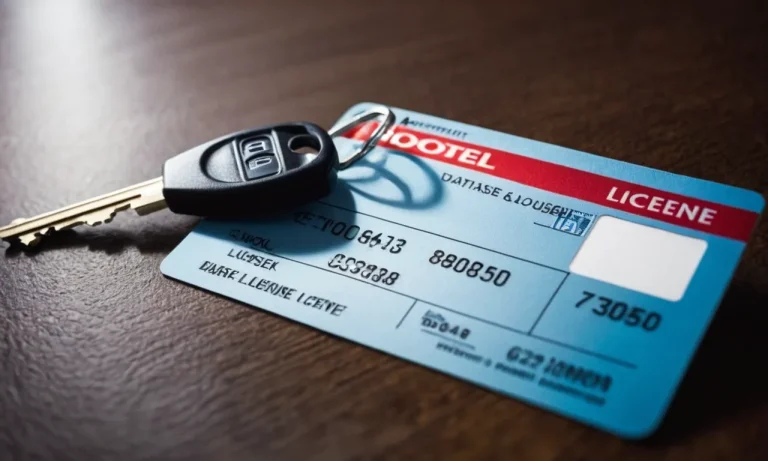Who Pays For Hotel Blocks: A Comprehensive Guide
Planning a large event, such as a wedding, conference, or family reunion, often involves securing a block of hotel rooms for guests. However, the question of who pays for these hotel blocks can be a source of confusion and uncertainty.
Whether you’re the event organizer or an attendee, understanding the financial responsibilities associated with hotel blocks is crucial.
If you’re short on time, here’s a quick answer to your question: The responsibility for paying for hotel blocks typically falls on the event organizer or the group coordinating the event. However, the specific payment arrangements can vary depending on the event type, negotiated contracts, and individual circumstances.
In this comprehensive article, we’ll delve into the intricacies of hotel block payments, exploring various scenarios, common practices, and strategies to ensure a smooth and cost-effective experience for all parties involved.
We’ll cover topics such as negotiating room rates, attrition clauses, and payment options, providing you with the knowledge you need to navigate this aspect of event planning with confidence.
Understanding Hotel Blocks
What is a Hotel Block?
A hotel block, also known as a room block or group block, is a reservation of a specific number of rooms at a hotel for a particular event or group. It’s a common practice for weddings, conventions, conferences, or any large gathering where attendees need accommodations.
Essentially, it’s a bulk booking that allows the organizers to reserve a dedicated set of rooms at a discounted rate. This ensures that guests have a convenient and affordable place to stay during the event. 😊
Benefits of Booking Hotel Blocks
- Discounted Room Rates: Hotels offer special rates for group bookings, making it more cost-effective for attendees.
- Convenience: Guests can easily book rooms within the block, ensuring they stay close to the event venue.
- Guaranteed Availability: By reserving a block, organizers can secure a specific number of rooms, preventing sell-outs.
- Personalized Experience: Hotels often provide additional amenities or services for group bookings, enhancing the overall experience.
Negotiating Room Rates and Contracts
When booking a hotel block, negotiating the room rates and contract terms is crucial. According to a study by Hotel News Resource, hotels typically offer discounts ranging from 10% to 25% off their standard rates for group bookings.
However, the final rate depends on factors like the size of the block, length of stay, and the hotel’s occupancy levels. Skilled negotiators can often secure even better deals by leveraging their bargaining power. 👍
It’s also essential to carefully review the contract terms, including attrition clauses (penalties for unfilled rooms), cancellation policies, and any additional fees or charges. Negotiating favorable terms can save significant costs and provide flexibility in managing the event. Many organizations enlist the help of professional meeting planners or event management companies to navigate the complexities of hotel block negotiations effectively.
Who Typically Pays for Hotel Blocks?
When it comes to securing hotel blocks for events, the question of who foots the bill often arises. The responsibility for paying for these reserved room blocks can fall on different parties, depending on the nature of the event and the arrangements made. Let’s delve into the most common scenarios:
Event Organizers and Coordinators
In many cases, the primary organizers or coordinators of an event are responsible for paying for hotel blocks. This is particularly true for large-scale events like conferences, conventions, or corporate meetings.
Event planners typically negotiate group rates with hotels and reserve a block of rooms to accommodate attendees. According to a study by EventManagerBlog, over 60% of event organizers handle hotel room block arrangements themselves.
By securing hotel blocks, organizers can offer discounted rates to attendees and ensure a convenient location for the event. They may cover the cost upfront and later pass it on to attendees through registration fees or sponsorship funds.
Alternatively, some organizers require attendees to book and pay for their rooms directly with the hotel, using the negotiated group rate.
Attendees and Guests
In certain situations, attendees or guests are responsible for paying for their own hotel accommodations within the reserved block. This is common for smaller events, such as weddings or family reunions, where the organizers may not have the resources to cover the costs upfront.
According to The Knot, around 75% of couples opt for attendee-paid hotel blocks for their weddings.
In these cases, the organizers secure a block of rooms at a discounted group rate, and attendees book and pay for their rooms directly with the hotel. This approach allows attendees to choose their preferred room type and take advantage of the negotiated rate while giving them the flexibility to make their own arrangements.
Sponsors and Vendors
For large-scale events with significant sponsorship involvement, sponsors or vendors may cover the cost of hotel blocks as part of their sponsorship package. This arrangement is particularly common in trade shows, exhibitions, or industry events where sponsors and vendors play a crucial role.
By providing hotel accommodations, sponsors can offer added value to attendees and increase their visibility at the event. According to EventManagerBlog, over 30% of sponsors consider hotel room blocks as a valuable sponsorship opportunity.
This approach not only benefits attendees but also strengthens the relationship between sponsors and event organizers.
Payment Options and Strategies
When it comes to booking hotel blocks for events like weddings, corporate retreats, or family reunions, understanding the various payment options and strategies is crucial. The financial arrangements can be complex, and it’s essential to navigate them carefully to avoid unexpected costs or penalties.
Let’s dive into the key aspects of payment options and strategies for hotel blocks.
Upfront Payments and Deposits
Most hotels require an upfront payment or deposit to secure a block of rooms. This amount can vary, but it’s common for hotels to request a non-refundable deposit of around 20-30% of the total estimated room revenue, according to Hotel News Resource.
The deposit serves as a guarantee for the hotel and ensures that the group is committed to the reservation. Failure to provide the deposit may result in the hotel releasing the room block.
Rooming Lists and Individual Reservations
Once the deposit is paid, hotels typically require a rooming list with the names of guests and their individual reservations. This list helps the hotel manage the block and track occupancy. Depending on the hotel’s policies, guests may be responsible for making their own reservations and providing payment, or the group organizer may handle the payments centrally.
According to a survey by Cvent, 63% of planners prefer individual reservations, as it simplifies the process and reduces the risk of attrition penalties.
Attrition Clauses and Penalties
Attrition clauses are common in hotel contracts for group bookings. These clauses outline the minimum number of rooms that must be booked and paid for, regardless of actual occupancy. If the group fails to meet this minimum, the hotel may impose attrition penalties or fees, which can be substantial.
According to Hotel News Resource, attrition penalties can range from 60-100% of the room revenue for the unsold rooms. To mitigate this risk, groups can negotiate attrition clauses, release dates, or consider attrition insurance offered by third-party providers.
Navigating payment options and strategies for hotel blocks requires careful planning and negotiation. By understanding upfront payments, rooming lists, and attrition clauses, event organizers can make informed decisions and avoid costly surprises.
Don’t hesitate to consult with experienced event planners or legal professionals to ensure a smooth and financially responsible experience. 😊
Factors Influencing Hotel Block Payment Arrangements
When it comes to securing hotel blocks for events, the payment arrangements can vary significantly depending on several key factors. These factors play a crucial role in determining who bears the financial responsibility for the reserved rooms and how the costs are distributed.
Let’s delve into the three main considerations that influence hotel block payment arrangements.
Event Type and Size
The nature and scale of the event are pivotal in shaping the payment dynamics. For large-scale corporate events, conferences, or conventions, it is common for the organizers or the hosting company to negotiate and secure hotel blocks on behalf of attendees.
In such cases, the organizers often bear the upfront costs and manage the payment arrangements. On the other hand, for smaller gatherings like weddings or family reunions, the hotel block costs are typically shouldered by the individuals or families hosting the event.
Negotiation Power and Leverage
The bargaining power held by event organizers or individuals can significantly impact the payment terms. Large organizations or well-established event planners with a track record of bringing in substantial business to hotels may have greater leverage in negotiating favorable terms, including flexible payment arrangements.
They can potentially secure attrition clauses that limit their financial liability if a certain percentage of rooms remain unoccupied. Conversely, smaller events or individuals may have less room for negotiation and may need to adhere to stricter payment policies set by the hotel.
According to a survey by Cvent, a leading event management platform, 63% of event planners reported that negotiating favorable terms with hotels is one of their top challenges. This highlights the importance of leveraging negotiation skills and industry connections to secure advantageous payment terms.
Budget Considerations
The available budget for an event often dictates the payment arrangements for hotel blocks. Well-funded corporate events or conferences may have the financial resources to prepay for a significant portion of the reserved rooms, allowing attendees to secure discounted rates or even complimentary accommodations.
In contrast, budget-conscious events or individuals may opt for a “courtesy room block” arrangement, where attendees are responsible for making their own reservations and payments directly with the hotel.
It’s worth noting that hotels may require a non-refundable deposit or financial guarantee from event organizers to secure a block of rooms, particularly for larger events. This deposit serves as a commitment and helps mitigate the risk of unsold rooms.
Striking a balance between budget constraints and securing favorable terms is a delicate dance for event planners and organizers.
Ultimately, the factors influencing hotel block payment arrangements are diverse and interconnected. By understanding the event type, leveraging negotiation power, and aligning with budget considerations, event organizers and individuals can navigate the complexities of securing hotel accommodations and determine the most suitable payment arrangements for their needs.
😊
Conclusion
Navigating the complexities of hotel block payments can be a daunting task, but with the right knowledge and strategies, you can ensure a seamless and cost-effective experience for all parties involved.
By understanding the various payment options, negotiating favorable contracts, and considering factors such as event type and budget, you can make informed decisions that align with your event’s goals and financial constraints.
Remember, open communication and clear expectations are key when it comes to hotel block payments. Whether you’re the event organizer or an attendee, it’s essential to clarify responsibilities and payment arrangements upfront to avoid any misunderstandings or surprises down the line.
With this comprehensive guide, you now have the tools and insights to confidently navigate the world of hotel block payments, ensuring a successful and stress-free event for you and your guests.







